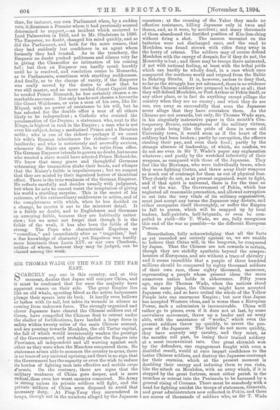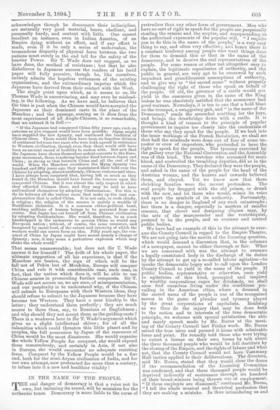SIR THOMAS WADE ON THE WAR IN THE FAR EAST.
SCARCELY any one in this country, and. at this moment, doubts that Japan will conquer China, and it must be confessed that for once the majority have apparent reason on their side. The great Empire lies like an old whale, spouting blood as the active harpooners plunge their spears into its back. It hardly even bellows or lashes with its tail, but takes its wounds in silence as -coming from unknown force. The strongly organised and 'clever Japanese have cleared the Chinese soldiers out of Corea, have compelled the Chinese fleet to retreat under the shelter of fortifications, have landed a large force in safety within twenty miles of the main Chinese arsenal, and are pouring towards Moukden, the old Tartar capital, the fall of which would irretrievably weaken the prestige of the Government, and probably shatter the Empire into Provinces, all independent and all warring against each other as they were when the Manchus conquered them. No statesman arises able to eummon the country to arms, there is no trace of any national uprising, and there is no sign that the Government has the capacity or even the wish to reduce its hordes of fighting men into effective and mobile corps el'arm4e. On the contrary, there are signs that the military weakness of China goes deeper, and is more radical, than even her worst enemies conceived. No Army is .strong unless its private soldiers will fight, and the private soldiers of China seem disposed to avoid that necessary duty. At Ping-Yang they surrendered in heaps, though not in the numbers alleged by the Japanese reporters ; at the crossing of the . Yaloo they made no effective resistance, killing Japanese only in twos and threes, and, as it were, by accident ; and many thousands of them abandoned the fortified position of Kiu-lien-ching without firing a shot. The cannon mounted on the batteries were not discharged once, and. the road to Moukden was found strewn with rifles flung away in the hurry of retreat. The soldiers may of course defend Moukden with the energy of despair, for if they do not, the Monarchy is lost ; and there may be troops there animated, if not with national feeling, at least with the tribal pride which can hardly be wholly dead, in a race which once conquered the northern world and reigned from the Baltic to Behring Straits. It is, however, useless to deny that, so far as the struggle has yet advanced, there is no evidence that the Chinese soldiery are prepared to fight at all; that they will defend Moukden, or Port Arthur or Pekin itself, or any other place, or in fact do anything except pillage the country when they see no enemy; and when they do see one, run away so successfully that even the Japanese never allege that they have overtaken them. As the Chinese are not cowards, but only, Sir Thomas Wade says, in his singularly instructive paper in this month's Con. temporary Review, contemptuous of the military virtues, their pride being like the pride of dons in some old University town, it would seem as if the heart of the soldiery had been broken ; partly by corruption, the officers stealing their pay, and even their food ; partly by the strange absence of leadership, of which, we confess, we do not see even in Sir T. Wade's paper any explanation whatever ; and partly by the wretched inferiority of their weapons, as compared with those of the Japanese. They feel like the Mexicans, who were individually brave, when they were fighting Cortez, and threw away their weapons as much out of contempt for them as out of physical fear. They clearly do not, as at present organised, want to fight, and if that spirit is universal, there is for the time an end of the war. The Government of Pekin, which has neglected all reasonable precaution, and allowed corruption to eat into the very vitals of its military organisation, must just accept any terms the Japanese may dictate, and. either reorganise itself thoroughly, or suffer the Empire to fall to pieces, which will be snapped up by local leaders, half-patriots, half-brigands, or even be com- pelled to yield—Sir T. Wade, we see, fully recognises this end of the war as possible—to the different European Powers.
Nevertheless, fully acknowledging that all the facts as yet recorded are entirely against us, we are unable to believe that China will, in the long-run, be conquered by Japan. That the Chinese are not cowards is certain, though they are stolidly apathetic beyond the compre- hension of Europeans, and are without a trace of chivalry ; and it seems incredible that a people of three hundred millions should be conquered by eighty thousand soldiers of their own race, these eighty thousand, moreover, representing a people whose present ideas the more numerous nation holds in abhorrence. Fifty years ago, says Sir Thomas Wade, when the nations stood on the same plane, the Chinese might have accepted Japanese rule, and so have united the whole of the Yellow People into one enormous Empire ; but now that Japan has accepted Western ideas, and is worse than a European Power, such a submission is inconceivable. China will rather go to pieces, even if it does not at last, by some convulsive movement, throw up a leader and. an army able, with the assistance of "works," which even the present soldiers throw up quickly, to arrest the pro- gress of the Japanese. The latter do not move quickly, they have scarcely any cavalry, and they must, as the months roll past, be losing their trained soldiery at a most inconvenient rate. One great skirmish won by the defenders, one engagement fought with even a doubtful result, would at once impart confidence to the better Chinese soldiers, and destroy the Japanese contempt for their enemies, which at the present moment is doubling their energy and inducing them to run risks, like the attack on Moukden, with an army which, if it is stopped by the great fortress, must either perish in the trenches or retreat into the Peninsula to be harassed by a general rising of Coreans. There must be somebody with a head for fighting amidst the troops of statesmen, Generals, and great administrators now collected in Pekin, and there are scores of thousands of soldiers who, as Sir T. Wade acknowledges though he denounces their indiscipline, are naturally very good material, brave, obedient, and personally hardy, and content with little. One cannot recollect an instance, even in Indian America, of an Empire dying without an effort, and, if any effort is made, even, if it be only a series of mob-rushes, the tremendous disparity of physical force between the two nations must surely in the end tell for the safety of the heavier Power. Sir T. Wade does not suggest, as we have done, the method of resistance ; but that he also disbelieves in Japanese success the readers of his lucid paper will fully perceive, though he, like ourselves, entirely admits the hopeless rottenness of the existing organisation, and the extraordinary impetus which the Japanese have derived from their contact with the West. The single point upon which, as it seems to us, Sir Thomas Wade is unconvincing, and may even be mislead- ing, is the following. As we have said, he believes that the time is past when the Chinese would have accepted the Japanese as their dominant caste in the place of the Manchus; and the passage, coming as it does from the most experienced of all Anglo-Chinese, is so remarkable, that we extract it in full :— "If the Japanese had conquered China fifty years ago, such an outcome as you suggest would have been possible. Japan might have supplied the new dynasty, and continued the tradition of Chinese ideas. There would then have been no hopeless division of sentiment between two races who were both agreed in resistance to Western civilisation, though even then there would still have been an ancient record of hostility to reckon with. But now that the Japanese have shown themselves ardent converts to the Euro- pean movement, there is a strong barrier fixed between Japan and China ; as strong as that between China and all the rest of the world. When the Manchus overthrew the Myng dynasty two hundred and fifty years ago, they maintained their hold over the Chinese by adopting, almost uniformly, Chinese customs and ideas. I have always been surprised that, having left so much as they found it, the Manchus should have forced the tonsure upon the conquered Chinese. But it was almost the only respect in which they offended Chinese ideas, and they may be said to have nationalised themselves by adopting Confucianism. For this is tha tie between all the various races that make up the vast con- glomeration that is called China, It is not only, or evei chiefly, a religion ; the religion of the masses is mainly a muddle of Buddhistic idolatries. It is a common ethico-political bond, enabling millions of human beings to be governed from one centre. But Japan has cut herself off from Chinese civilisation by adopting Occidentalism. She would, therefore, be as much handicapped in the endeavour to govern China as would any European nation ; without, of course, the same resources, and hampered by racial feud, of the extent and intensity of which the western world can scarce form an idea. Fifty years ago, the con- quest of China by Japan might have meant merely a change of dynasty; now, it may mean a portentous explosion which may shake the whole world."
That seems unanswerable ; but does not Sir T. Wade answer it for himself ? The drift of his whole paper, the ultimate suggestion of all his experience, is that if the Manchus are beaten, the sign of which will be the fall not of Pekin but of Moukden, Europe will conquer China and rule it with considerable ease, such ease, in fact, that the nation which does it, will be able to use Chinese armies in prosecuting further conquests. Sir T. Wade will not accuse us, we are sure, of misrepresentation, and our -perplexity is to understand why, if the Chinese will submit to Europeans with their Western ideas, they should refuse to submit to the Japanese because they have become too Western. They have a near kinship to the latter; they understand them perfectly ; they are much nearer to them than, say, to Russians or Englishmen ; and why should they not accept them as the guiding caste ? There is a weakness here in Sir T. Wade's argument which gives us a slight intellectual shiver ; for of all the calamities which could threaten ads little planet and its peoples, the full possession by Japan of the resources of China would be the most disastrous. She would organise the whole Yellow People for conquest, she would expend them remorselessly, and certainly in Asia, if not also in Europe, she would encounter no adequate resisting force. Conquest by the Yellow People would be a fine end, both for the semi-Aryan civilisation of India, and for our own attempt, now protracted for more than a century, to infuse into it a new and healthier vitality !



















































 Previous page
Previous page